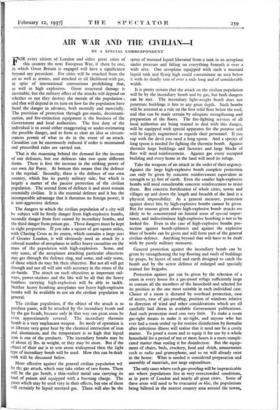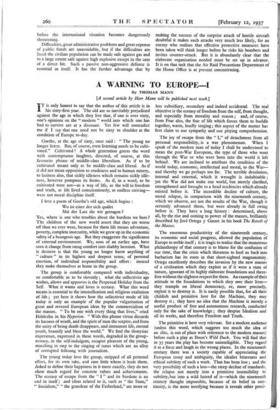AIR WAR AND THE CIVILIAN -I
BY A SPECIAL CORRESPONDENT
FOR every citizen of London and other great cities of this country the next European War, if there be one, in which Great Britain is engaged will have a significance beyond any precedent. For cities will be attacked from the air as well as armies, and attacked in all likelihood with gas, in spite of international conventions prohibiting that, as well as high explosives. Great structural damage is inevitable, but the military effect of the attacks will depend on whether or not they destroy the morale of the population ; and that will depend in its turn on how far the population have faced the danger in advance, both mentally and materially. The provision of protection through gas-masks, decontami- nation, and fire-extinction equipment is the business of the Government and local authorities. The first duty of the individual is to avoid either exaggerating or under-estimating the possible danger, and to form as clear an idea as circum- stances permit of what to do in the event of an attack. Casualties can be enormously reduced if order is maintained and prescribed rules are carried out.
That is the reasoning behind the demand for the increase of our defences, but our defences take two quite different forms. There is first the increase in the striking power of our own Air Force. At bottom this means that the defence is the reprisal. Secondly, there is the defence of our own country, which has its purely military side, but which is largely a matter of the passive protection of the civilian population. The second form of defence is and must remain essentially civilian. It is the essential defence and it has the incomparable advantage that it threatens no foreign power, it is non-aggressive defence.
The dangers to which the civilian population of a city will he subject will be firstly danger from high-explosive bombs, secondly danger from fires caused by incendiary bombs, and the third danger from poison gas. Those dangers must be kept in right proportion. If you take a square of 400 square miles, with Charing Cross as its centre, which contains a large part of Greater London, it will obviously need an attack by a colossal number of aeroplanes to inflict heavy casualties on the mass of the population with high-explosives. Some, and only some, of the aeroplanes attacking particular objectives may get through the defence ring, and some, and only some, of those which do may hit their objective. But not all will get through and not all will aim with accuracy in the stress of the air-battle. The attack on such objectives as important rail- ways, power-stations and the like will be all that the heavy bombers carrying high-explosives will be able to tackle. Neither heavy bombing aeroplanes nor heavy high-explosive bombs will be available to use on the civilian population in general.
The civilian population, if the object of the attack is to produce panic, will be attacked by the incendiary bomb and by the gas bomb, because only in that way can great areas be even approximately covered. The incendiary thermite bomb is a very unpleasant weapon. Its mode of operation is to liberate very great heat by the chemical interaction of iron and aluminium, and the temperature is so high that liquid iron is one of the products. The incendiary bombs may be of about zi lbs. in weight, or they may be more. But if the object of their use is to sow arson widespread then the light type of incendiary bomb will be used. How this can be dealt with will be discussed below.
More effective against the general civilian population wil be the gas attack, which may take either of two forms. There will be the gas bomb, a thin-walled metal case carrying its load of poison and equipped with a bursting charge. The gases which may be used vary in their effects, but one of them will certainly be liquid mustard gas. There will also be the spray of mustard liquid liberated from a tank in an aeroplane under pressure and falling on everything beneath it over a wide area. One aeroplane equipped with such a mustard liquid tank and flying high could contaminate an area below with its deadly rain of over a mile long and of considerable width.
It is pretty certain that the attack on the civilian population will be by the incendiary bomb and by gas, but both dangers can be met. The incendiary light-weight bomb does not penetrate buildings it hits to any great depth. Such bombs will be arrested as a rule on the first solid floor below the roof, and that can be made certain by adequate strengthening and preparation of the floors. The fire-fighting services of all local authorites are being trained to deal with this danger, will be equipped with special apparatus for the purpose and will be largely augmented as regards their personnel. If you sup with the devil you need a long spoon. And a species of long spoon is needed for fighting the thermite bomb. Against thermite large buildings and factories and large blocks of flats will need reinforcement. Against gas every occupied building and every home in the land will need its refuge.
Take the weapons of air attack in the order of their urgency. Against the large high-explosive bomb complete protection can only be given by concrete reinforcement equivalent in strength to 35 feet of earth. Even the smaller high-explosive bombs will need considerable concrete reinforcement to resist them. But concrete fortification of whole cities, towns and villages up and down the length and breadth of the land is a physical impossibility. As a general measure, protection against direct hits by high-explosive bombs cannot be given. But for reasons given above high-explosive bomb attacks are likely to be concentrated on limited areas of special impor- tance, and indiscriminate high-explosive bombing is not to be looked for. Even in the case of high-explosive bombs pro- tection against bomb-splinters and against the explosive blast of bombs can be given and will form part of the general civilian defence. Anything beyond that will have to be dealt with by purely military measures.
General protection against the incendiary bomb can be given by strengthening the top flooring and roofs of buildings by props, by layers of sand and earth designed to catch the bomb and by the active defence of enlarged and specially trained fire brigades.
Protection against gas can be given by the selection of a room in every house for a gas-proof refuge sufficiently large to contain all the members of the household and selected for its position as the one most suitable in each individual case. Choice of a room is dictated by overhead protection, ease of access, ease of gas-proofing, position of windows relative to direction of wind and other considerations which are all carefully laid down in available Government publications. And such protection need cost very little. To make a room gas-tight means to make it air-tight, and anyone who has ever had a room sealed up for routine disinfection by formalin after infectious illness will realise that it need not be a costly matter. To proof a room and to equip it for use by a whole household for a period of ten or more hours is a more compli- cated matter than sealing it for disinfection. But the equip- ment of chairs, beds, crockery, food and drink, amusements such as radio and gramophone, and so on will already exist in the house. What is needed is considered preparation and assembly of materials, not large expenditure.
The only cases where such gas-proofing will be impracticable are where populations live in very overcrowded conditions, as in parts of London and nearly all great cities. Some of these areas will need to be evacuated en bloc, the populations being billeted in the nearest country area around the towns, before the international situation becomes dangerously threatening.
Difficulties, great administrative problems and great expense of public funds are unavoidable, but if the difficulties are faced the civilian population can be made safe against gas and to a large extent safe against high explosive except in the case of a direct hit. Such a passive non-aggressive defence is essential in itself. It has the further advantage that by making the success of the surprise attack of hostile aircraft doubtful it makes such attacks very much less likely, for an enemy who realises that effective protective measures have been taken will think longer before he risks his bombers and invites counter-attack. But it is abundantly clear that the elaborate organisation needed must be set up in advance. It is on that task that the Air Raid Precautions Department of the Home Office is at present concentrating.















































 Previous page
Previous page